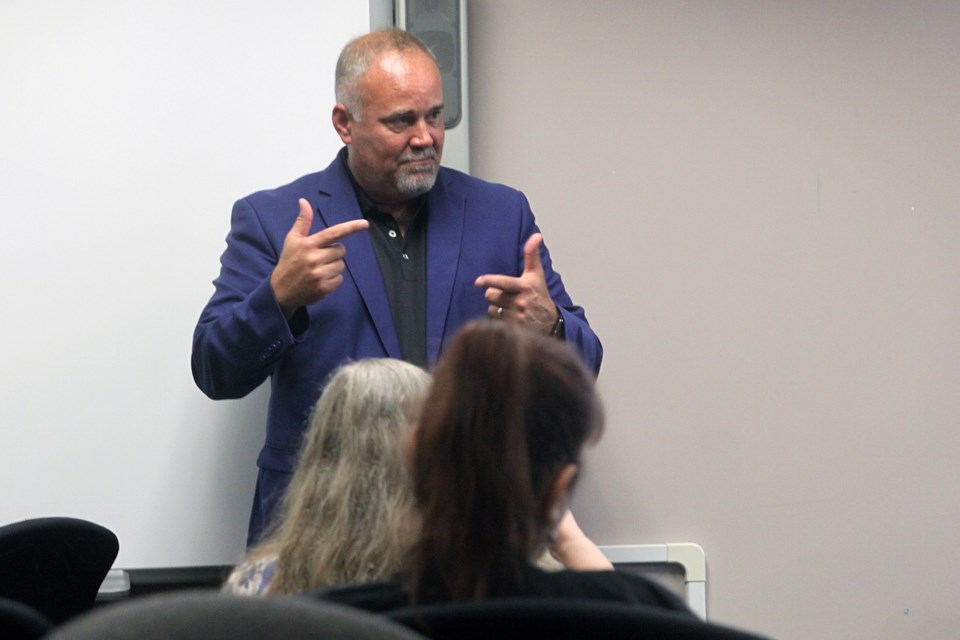THUNDER BAY – Local parents of children with autism are hoping their voices have been heard as the province goes back to the drawing board to again develop a new strategy.
A handful of parents met with Children, Community and Social Services Minister Todd Smith on Wednesday morning in Thunder Bay, as Smith travels across Northern Ontario on a listening tour this week to gather feedback as the Progressive Conservative government formulates its second attempt to revamp the Ontario Autism Program.
Smith last week announced that the government would be putting a needs-based model in place, reversing course from significant changes it made earlier this year to directly give families money based on their income and age of their children rather than fund regional service providers.
Those changes, which the Ford government claimed was meant to clear massive waiting lists, were the subject of outrage from parents, who said the funding wouldn’t cover treatment expenses and that there wasn’t enough capacity from providers to access services.
The minister, who took hold of the portfolio only five weeks ago after a summer Queen’s Park cabinet shuffle, said it’s important for him to hear from parents and service providers to learn why previous programs haven’t worked.
“It’s really important that the service that kids are receiving matches the level of severity of their autism. What we’re going to do is help as many kids as possible within the $600 million envelope of funding,” Smith said.
“We should be able to help an awful lot of kids in the future. This is a program that will have to be sustainable. We don’t want to be back here a year or two from now developing another program.”
The government in May announced the establishment of a 20-person autism advisory panel, which is tasked with making recommendations to Smith for the creation of the revamped Ontario Autism Program.
Anne Antenucci, the mother of a seven-year-old with autism, appreciated the opportunity to have the in-person meeting with Smith after what she described as an “impersonal” telephone call-in consultation with former minister Lisa MacLeod.
But the lack of Northwestern Ontario representation on the advisory panel is concerning, Antenucci said, adding that the availability and capacity of service providers is a particular issue in the region.
“When you have a child with autism, you can’t just hire the girl down the street to come and take care of them,” Antenucci said.
“You need to have somebody who has specialized care and specialized knowledge. That can get pricey and also we just don’t have the capacity of the service providers here for that. Giving us a ton of money – as much as we appreciate it – it doesn’t do anything here in the north when you don’t have the providers to provide that service you can pay for.”
Smith said he has heard “loud and clear” about the difficulty accessing services.
“If it comes to providing some incentives to people to come to Northwestern Ontario, to commit to staying here for a period of time to ensuring kids get the treatment, that’s something the panel and our team will have to look at,” Smith said.
The changes, which included defunding for regional service providers like Child and Community Resources, created uncertainty and a sense of destabilization.
Sherry Fournier, executive director of Child and Community Resources, said the organization which covers the Thunder Bay, Rainy River, Kenora, Algoma, Manitoulin and Sudbury districts lost nearly half their staff and their presence in many smaller communities.
Fournier said she gave Smith a briefing note and is confident the organization can meet the needs of 1,200 children across their coverage area.
“We have to build a program that allows parents to move in, move their child in and out of the system when they need it,” Fournier said. “We also need to rely on the evidence the experts have so that tells us who should get what when. We can do this, if given the opportunity.”
One single mother from Manitouwadge told the session she has to drive eight hours for her child to access services in Thunder Bay.
Smith acknowledged the challenges presented by the vast geography of Northwestern Ontario.
“It’s very difficult when you travel eight hours to receive treatment to get any kind of benefit from that treatment,” Smith said. “It has to be a sustained level of treatment.
Smith earlier this week held a meeting in Kenora and is scheduled to head to Sault Ste. Marie and Sudbury.
